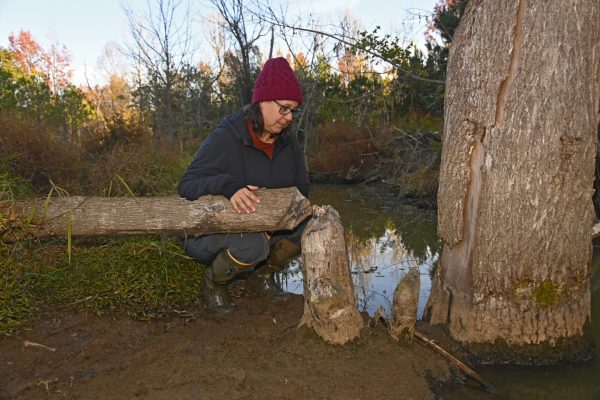Dr. Sandra Clinton inspires new generations of women in STEM

Sandra Clinton loved science from her earliest school experiences — and imagined a career working for a science-related nonprofit or government agency.
“I wanted to save the world and change it,” she said.
Clinton, a research assistant professor in UNC Charlotte’s Department of Geography & Earth Sciences, has found different ways to change the world through STEM. A river ecologist focusing on understanding human impacts on stream ecosystems, she currently studies how urban beaver ponds function compared to human-made stormwater ponds in maintaining the health of urban streams.
She’s also a leader with PROGRESS: Promoting Geoscience Research, Education and Success, a mentoring-based program to retain women in STEM, specifically undergraduate students who identify as women and are interested in earth and environmental science.
Mentoring drives retention
PROGRESS began with college students in the Carolinas — including at Charlotte — and in Colorado. It is now expanding to Texas and Georgia. Through funding from the National Science Foundation that has made new outreach possible, students are matched with peer and professional mentors, learn to network and gain practical skills.
A controlled study found that women in PROGRESS have more mentors compared with women not in the program — and higher retention rates in their degrees, explains Clinton, who leads the organization’s Carolinas section. The connection between mentors and retention is important.
“A lot of undergraduate women leave their STEM degree in their second year, for various reasons. Some suffer from imposter syndrome, thinking they are not good at science; and in some male-dominated programs, such as physics, women students can feel lonely,” Clinton said. “Seeing somebody like you can have a huge impact on whether or not you think you can do this.”
That’s what Clinton experienced when she met noted ecologist Nancy Grimm. After college, Clinton became a research technician at a lab at Arizona State University. Grimm, her supervisor, was one of the first women Clinton had ever worked with.
“She was a female professor doing river ecology, and she had a family,” Clinton said. “She showed me this could be a career.”
Greater diversity leads to better research outcomes
“People with different experiences and perspectives bring different ways of looking at research questions based on who we are as much as our training,” she said. “If everybody thinks the same way, science doesn’t progress.”
“Women make up more than half the planet,” Clinton added. “We need to be more than half the people at every table, not just the STEM table.”
Read the full article here